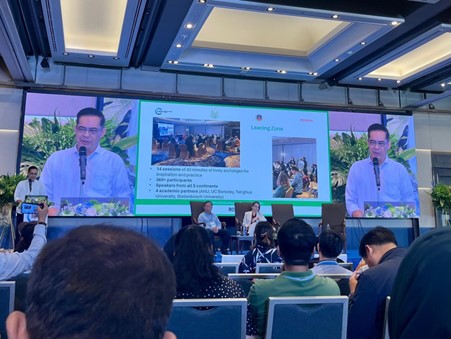Stellenbosch University was recently represented at two International Union for Conservation of Nature (IUCN) regional Forums, in their capacity as a member of the IUCN Academy. The Academy, launched in September 2021, consists of a select group of seven global academic partners representing each continent who support the IUCN in the development of innovative and qualitative training in the broad field of nature conservation, taking a multidisciplinary and integrated approach on the topic. The Academy is one of IUCN’s initiatives to strengthen the mandate and contributions of biodiversity science to within the IUCN. Stellenbosch University, represented by Dist. Prof. Karen Esler (Dept. Conservation Ecology & Entomology), participates along with representatives from globally top-ranked universities - California University Berkley (USA), Cambridge University (Britain), University of Campinas (Brazil), Tsinghua University (China), ETH Zurich (Switzerland) and Australia National University (Australia).
The IUCN held its first Africa Forum in Kenya at the end of June 2024. This historically significant meeting was the first time African IUCN member governments, NGOs and research institutions collectively met to share their vision for nature conservation and to set a united agenda ahead of the 2025 IUCN World Conservation Congress in Abu Dhabi. Up to this point, a unified African voice on the global conservation agenda has not been possible. The regional Forum provided a first opportunity for Africa to forge collaborations, initiate stakeholder dialogue and to set and influence the global nature conservation agenda. This was a significant step for our vulnerable, yet biodiversity rich continent to rectify N-S imbalances in conservation agendas. In attendance was former South African Minister of Environment and former president of the IUCN, Vali Moosa. Significantly, he spoke about the need for our continent to reduce its dependency on foreign funding and to increase national contributions to conservation institutions and authorities. He recognized Africa’s precious biodiversity and rich human resources (including leading conservationists) as assets in this push to regain control. Financing was a recurrent theme throughout the meeting as were Joint solutions for people and nature; equity and justice, including stronger participation from local and indigenous peoples; climate change and links to sustainable and restorative agriculture. Of significance to our institution, where Conservation Ecology resides within the Faculty of Agrisciences, was a session on ‘Sustainable Agriculture and Ecosystem Restoration through Nature Based Solutions in Africa’. Traditionally, the IUCN and FAO have retained their separate agendas, but very clearly and importantly, these sectors now have an imperative to unite to ensure solutions for both people and biodiversity.
The second meeting was held in early September 2024, in Bangkok, Thailand. This was the 8th IUCN Asia Regional Conservation Forum, gathering around 600 conservation leaders under the theme “Reimagining Conservation in Asia: A Nature Positive Future”. As with the African event, the Academy presented a three-day dedicated ‘Learning Zone” event, designed to share knowledge and IUCN tools and inspire new thinking for nature and biodiversity conservation. At both learning zones, Prof. Esler presented a well-received talk on “How green spaces influence our wellbeing”.
The IUCN Regional Conservation Fora are held every four years across regions of the world and help to initiate a year-long process for IUCN Members to submit their motions on important conservation priorities for the respective regions. These are then taken to the IUCN World Congress (a quadrennial statutory IUCN event) where they are shared, debated and adopted, guiding the Strategic Vision for the Union. The next IUCN World Congress will take place in October 2025 in Abu Dhabi, United Arab Emirates.

Photo: The Learning Zone received much attention in Bangkok; Stellenbosch University’s contribution was acknowledged in the closing ceremony of the Asia Regional Conservation Forum.
Written by Karen Esler, kje@sun.ac.za/a>

